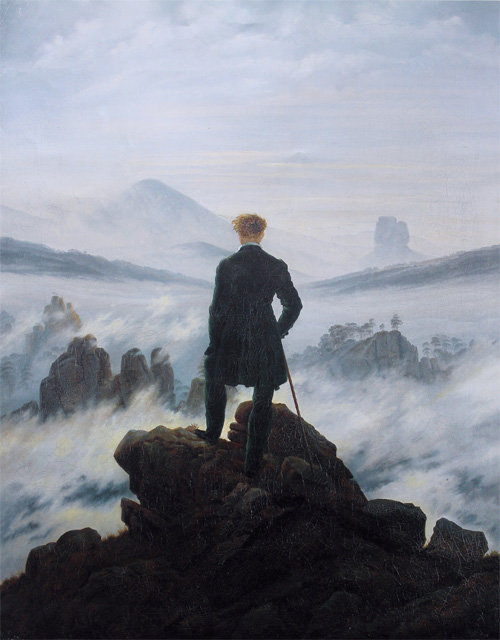Life is a picnic
Life is a picnic
Posted June. 27, 2019 07:35,
Updated June. 27, 2019 07:35

On a rugged cliff stands a man, wearing a dark green coat and holding a long cane. His short hair is blowing in the wind and the man is staring at the foggy landscape. Is he in awe of the scenery or is he realizing how small he is in front of the nature? His back does not show expressions on his face.
“Wanderer above the Sea of Fog,” which was drawn in 1818 by German Romantic painter Caspar David Friedrich, shows the back of a lonely wanderer surrounded by Mother Nature. His landscape paintings often prompt curiosity and cause one to introspect rather than to enjoy them with serenity. The man in the painting is thought to be either a fallen German officer or a Christian, or the painter himself. In fact, it is not important who the man symbolizes. Friedrich drew people from the back on purpose to give anonymity and universality to the characters in his paintings.
The man is standing on the top of a rocky mountain and gazing at the sublime landscape in awe. The painter placed the man in the center with his back to us so that the spectator gets immersed into the landscape of the painting. The background of the image is the Elbe Sandstone Mountains between Germany and the Czech Republic, where the painter randomly climbed on a trip while he was away from home due to a war.
Our course of life is often compared to climbing a mountain. Arriving at the top of a mountain is like reaching the peak or the end of our life. The man in the painting seems like he is standing at the end of his life. Friedrich once said, “The painter should paint not only what he has in front of him, but also what he sees inside himself.” Then, the scene the man in the painting is looking at might be either the kind of heaven he dreamed of or the intense moments of his life he recalled at the last minute of his life.
Poet Cheon Sang-byeong likened life to a picnic. The last part of his poem “Back to Heaven” goes, “The day when I end this picnic in this beautiful world, I will go and say it was beautiful.” When we end our own picnic in this world, will we be able to stand on the top of the mountain like that wanderer in the painting and say it was a beautiful picnic?
tjdrud0306@donga.com







